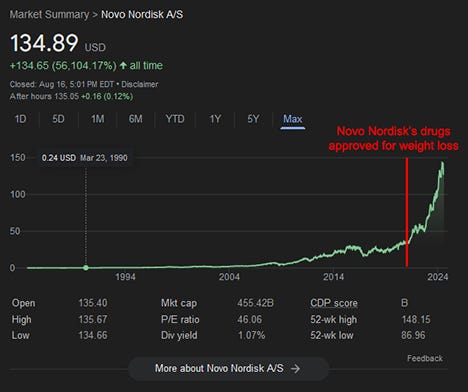[ed. Re: Ozempic and other 'weight loss' drugs.]
Last time, we asked - how will the economy handle a $12,000/year drug that everyone wants?
Now we have an answer: the compounding loophole.
Compounding pharmacies are pharmacies that make some drugs on site. Don’t imagine fancy chemistry labs; imagine something more like them putting powder into capsules. They can get you unusual doses (for example, if you’re a hyper-responder and need a pill smaller than the smallest standard version) or unusual formulations (for example, if you have digestive problems and want a usually-solid medication as a liquid, or vice versa.)
Compounding pharmacies aren’t supposed to compete with Big Pharma. They’re usually just some storefront where one guy with a PharmD degree pours powders into things. Big Pharma has the patents and heavily-FDA-regulated factories. It would be unfair to let compounding pharmacies ignore the patents and regulations everyone else has to follow. So they’re usually under lots of restrictions.
But the law says that compounding pharmacies are allowed to step in and compete with Big Pharma during a shortage. And guess which drugs are in constant shortage because every obese person in the country has wanted them for the past year?
So enterprising startups have hit upon the business model of connecting would-be patients to friendly doctors and compounding pharmacies. From the customer perspective, this looks like filling in a form on a website and getting cheap GLP-1 agonist drugs in the mail the next day.
How do the compounding pharmacies get it?
They say it’s through the same factories that make the official version for Big Pharma. If I understand the situation, nameless Chinese factories make the chemical itself, and Novo Nordisk (the pharmaceutical company that owns the official patent) does some fancy encapsulation work at their own plants. But they have a permanent capacity problem because of logistical and regulatory issues, so the nameless Chinese factories sell the extra to the compounding pharmacies on the side.
How much does is cost?
HenryMeds is $297/month, Eden is $296, Mochi is $254 - compared to the $1,300/month you’d pay for the official product. This isn’t covered by insurance, so it’s still not affordable for lots of people. But it’s more affordable than the $1,300/month version. Also, there’s not a shortage of it. (...)
So this is good, right?
I’m pretty encouraged by it. Not only does it provide GLP-1 drugs for a quarter of the price, but also people were really worried that diabetics wouldn’t be able to get their diabetes drugs because dieters would grab them off the shelf first. But now there’s more than enough GLP-1 agonists for everybody. This dramatically demonstrates how drug shortages are mostly regulatory problems (Adderall users, take note!)
What about paying back the patent-holders?
That is the one disadvantage.
The good news for them is that insurances mostly don’t cover these compounding pharmacies. So the people who really medically need the drugs will get them via insurance, and insurance will pay full price to the patent-holders. The compounding pharmacies will just pick off the people who only want them for cosmetic reasons, or who have bad insurance - most of whom wouldn’t have been able to get them through the normal system anyway.
Don’t get me wrong, this does probably take a big chunk out of Novo Nordisk’s profits. But Novo Nordisk’s stock price currently looks like this:
…and they’re now the most valuable company in Europe. So they can probably eat the loss.
What happens when the shortage ends?
Compounding pharmacies are only allowed to do this because of a law that suspends some drug regulations during a “shortage”, ie when the drug is on the FDA’s drug shortage list.
At some point, Novo Nordisk will build enough factories to meet capacity and there won’t be a shortage anymore. What then? Will the fun be over? Will GLP-1 agonists go back to costing $1,200/month again? Will most of the current users have to stop the drug and regain the lost weight? This would make tens of thousands of people really mad. I don’t know if the FDA has the guts to offend that many people. Their style is more to crush drugs before they ever come out, before anyone knows what they’re missing.
During COVID, the DEA said that telemedicine was allowed to be cheap and convenient so patients could get care during lockdown. After the pandemic died down, they tried making it hard and expensive again, but so many patients protested that they backed off. The uproar we’ll get if the FDA tries to make GLP-1 drugs expensive again will make that one look like a tempest in a teapot.
by Scott Alexander, ACX | Read more:
Image: Novo Nordisk
